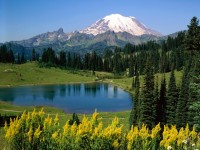
Many are confused about how to approach Scripture. Should we approach it like a novel or history book to be read and enjoyed? Or should we approach it like a text book to be studied and analyzed? The answer is: Yes.
It is helpful if we remember that both the Bible and nature are forms of divine revelation, and based on this, realize that we can approach Scripture in the same way we approach nature.
How does one approach nature?
You can approach it as a scientist, seeking to categorize, systematize, and organize it, or you can approach it like a person who sits in their backyard, listening to the birds and watching the sunset. He also is encountering, appreciating, and enjoying nature, but in a much different way, for a much different purpose, with a much different result.
And the two approaches must not mock each other.
The scientist must not sneer at the guy sitting in his back yard enjoying the sunset, saying, “He doesn’t know anything about nature. I have my degrees, and advanced research tools. I am a research professor at a prestigious university. I have published books and articles. That man knows nothing of nature.”
So also, the man sitting his back yard must not scoff at the scientist, saying, “He has his books and theories and classrooms, but when was the last time he drank in the colors of the evening sky? When was the last time his heartbeat echoed the songs of the birds? That scientist knows nothing of nature.”
No, people can enjoy nature and study nature, and both are proper ways of approaching and appreciating nature.
All this is also true of Scripture.

Scripture can and should be enjoyed just by reading it and hearing the stories of love and pain, or faith and doubt echo through your own soul. But Scripture can also be studied and analyzed, in an attempt to answer some of the ultimate questions. But the two approaches must not mock each other. Both are needed. Both are valid.
But we must always remember. Science is not nature, and theology is not Scripture. Theology is the attempt to understand and explain the data within Scripture, just as science is the attempt to understand and explain the data within nature. This distinction must be maintained. Why? Because while Scripture and nature are forms of divine revelation, the study of both of these has led to some very bad things.
Nature scholarship comes in the form of medicine, aeronautics, engineering, physics, etc, and results in things like medicine, electricity, and space travel. But it also has resulted in guns, nuclear bombs, and biological warfare.
Scripture scholarship comes in the form of Greek and Hebrew experts, cultural background insights, theologians, and results in things like love, acts of service, and generosity. But it has also resulted in witch hunts, wars in the name of Christ, and the building of Christian empires.
And just as there are certainties we have learned from nature, such as the laws of science, gravity, and thermodynamics, there are also certainties we can learn from Scripture, such as the holiness of God, our own sinfulness, and our need to believe in Jesus for eternal life.
So keep reading, keeping studying, keep learning. During some phases of your life, you will want to study more. During others, you will want to just sit back and enjoy the sunset. Enjoy both for what they are — different ways of experiencing and understanding Scripture so that through it, God inspires you to live more like Jesus in this world.




interesting post jeremy– having done the textbook thing for so many years, and now having totally changed my perspective, it is good for me to be reminded that i need to respect both sides and not be so polarized in my thinking
Thanks Keri. Good to “see” you again.
Some look at nature and see the art and recognize the artist. Others see a view, a picture, a bird or whatever. I see the hand of the master artist at work. I see that hand in Scripture, and also in many other things (including other writing). As my photography teacher and my art teacher said, most of us need to learn “how to see”.
I was just thinking that today. I am glad our brain has “filters,” but I sometimes wonder what we have taught ourselves to overlook.